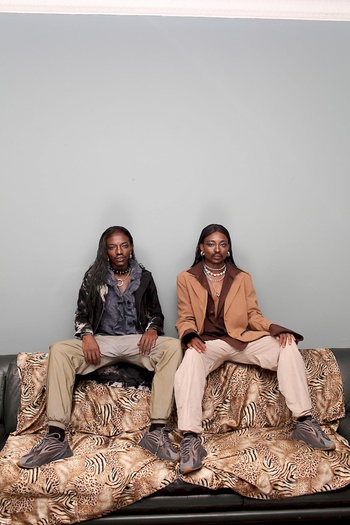With their remarkable art and music collective FAKA, Desire Marea and Fela Gucci aspire to infiltrate our patriarchal, heteronormative society with performances in which they – black, queer, and proud – also feel comfortable.
© Nick Widmer
“Faka” means “occupy”, “penetrate”, or “conquer” in Zulu, and that is precisely what Desire Marea and Fela Gucci aspire to do with their remarkable art and music collective: infiltrate our patriarchal, heteronormative society with performances in which they – black, queer, and proud – also feel comfortable.
“We started this because we wanted to create an alternative narrative for a black queer identity,” Marea says. “Things about which other people stay silent, feel uncomfortable, or are unnecessarily ashamed, those are the things that we put into practice.”
Alternating between sound and image, this practice not only transcends gender boundaries but also disciplinary boundaries. The music videos that they produce and the clothes that they wear during performances are just as important as the sounds that accompany them. “Desire had introduced me to the experimental electronic gqom music in 2012, when I visited him in Durban,” Gucci explains. “It was popular during club nights there, and it intrigued us so much that we wanted to make our own interpretation of it.”

© Nick Widmer
The music is featured on the EPs Bottoms Revenge (2016) and Amaqhawe (2017). Under the auspices of the NON Worldwide label, FAKA came to Europe and gave an intoxicating performance during the BRDCST festival. Their first full album, which they are working on at the moment, will again combine the raw, trance-like beats and scintillating polyrhythms that they picked up in the townships in Durban with messages that will hearten the LGBTQ+ community.
“I did struggle, and I did feel ostracized,” Marea says about his youth in a rural village. “There was nobody in my surroundings who looked like me. I think there's potential everywhere for black communities to love queer identities. I was inspired by pioneers like the singer Brenda Fassie and that one transwoman from my youth of whom I have very fond memories. Thanks to them, I did feel represented. That's why it is so important for us to be visible now, including in the mainstream. Especially in South Africa, there is still a very big wall between the mainstream and alternative expressions.”
All the more reason to continue assertively to champion the “my body my rights” principle. “When I was a child, criticizing Nelson Mandela was like blasphemy or speaking badly of Jesus,” Marea concludes. “But when he made negative comments about the way the two female members of Boom Shaka moved and dressed, I felt affronted. I absolutely loved that popular, black, but especially unabashed kwaito band and the most important person on earth at the time said that the people I thought were most beautiful in the world were inappropriate.”
Read more about: Muziek
Fijn dat je wil reageren. Wie reageert, gaat akkoord met onze huisregels. Hoe reageren via Disqus? Een woordje uitleg.